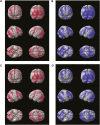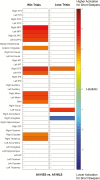Neural reward processing in self-reported short sleepers: examination of gambling task brain activation in the Human Connectome Project database
- PMID: 31152181
- PMCID: PMC7458276
- DOI: 10.1093/sleep/zsz129
Neural reward processing in self-reported short sleepers: examination of gambling task brain activation in the Human Connectome Project database
Abstract
Study objectives: Much of what we assume about the effects of short sleep duration on neural reward processing derives from total sleep deprivation studies. Although total sleep deprivation appears rare, habitual short sleep is common: 30% of working US adults report habitually sleeping ≤ 6 hours/night. It remains largely unknown whether habitual short sleepers exhibit similar reward processing brain activation patterns to those observed following total sleep deprivation in prior studies. Therefore, our aim was to test objectively reward processing brain activation patterns associated with self-reported habitual short sleep duration in a large sample.
Methods: Nine hundred and fifty-two adult participants from the Human Connectome Project database were grouped on reported habitual short (≤6 hours) vs. medium-length (7-9 hours) sleep duration using the Pittsburgh Sleep Quality Index (PSQI). Reward processing brain activation was examined using a gambling task during functional magnetic resonance imaging (fMRI). Subject-level covariates for age, sex, continuous sleep duration, daytime dysfunction, and PSQI total score are provided as supplemental analyses.
Results: Brain activation patterns revealed expected reward processing-related activation for age and sex. However, activation for sleep duration, dysfunction, and PSQI score did not correspond to those evident in previous total sleep deprivation studies.
Conclusions: Self-reported short sleep duration, perceived sleep-related dysfunction, and sleep quality via PSQI do not appear to be meaningfully associated with activation in well-described regions of the human neurobiological reward circuit. As these findings are counter to prior results using experimental sleep deprivation, future work focused on more direct comparisons between self-reported sleep variables and experimental sleep deprivation appears warranted.
Keywords: habitual short sleep duration; fMRI; reward processing; total sleep deprivation.
© Sleep Research Society 2019. Published by Oxford University Press on behalf of the Sleep Research Society. All rights reserved. For permissions, please e-mail journals.permissions@oup.com.
Figures



References
-
- Hirshkowitz M, et al. .. National Sleep Foundation’s updated sleep duration recommendations: final report. Sleep Heal. 2015;1(4):233–243. - PubMed
Publication types
MeSH terms
Grants and funding
LinkOut - more resources
Full Text Sources
Medical
Research Materials

